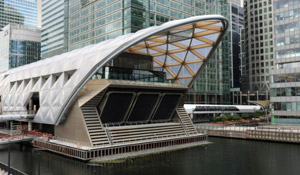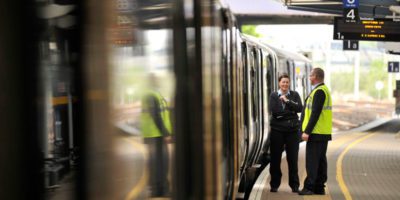Heather McPherson is Crossrail Handover Manager, working for Bechtel – a Crossrail project delivery partner, where she is responsible for managing the handover of stations, portals, shafts, and tunnels to London Underground and Rail for London at the end of the project. Prior to Crossrail, she came over to Britain from Australia and spent five years as a project manager on the Network Rail Thameslink programme. As part of this role Heather worked on the £900m London Bridge station and the £300m Farringdon Station redevelopments.

“…Engineering is a fantastic career choice for people wanting to work internationally. Many major engineering companies have projects all over the world, and welcome the ability to move people around projects…”
Heather, please can you tell us about your career to date and how you became interested in construction and engineering?
I’ve always loved science and maths so I studied Biomedical Engineering at the University of Western Australia (UWA) in Perth from 1997 to 2001. The course was really interesting – I graduated with a Bachelor Degree in Electrical Engineering and a Bachelor of Science.

After university I was accepted into the P&O Ports (now Dubai Ports World) graduate scheme in Fremantle. The work was focused on logistics rather than engineering. After a year the company moved me to Sydney where I lived for four years, eventually becoming a Project Manager. There was a lot of travel, including to India where I worked on a software development project.
I wanted to have a career change from logistics into construction, and after I arrived in London in 2007 I worked for Network Rail as Client Project Manager on the £6.5bn Thameslink Programme, managing work packages up to £70m on Farringdon and London Bridge stations. Working in construction is very rewarding – you get to see the physical results of your hard work being built around you.
In July 2012 I left Network Rail and joined Bechtel, a global engineering, construction and project management company with projects all over the world. Bechtel is a project delivery partner on Crossrail, and I started out as the Crossrail Interface Manager, heading up the interface with London Underground. I transitioned into the Handover Manager role in late 2013. I’ve been working for Bechtel on the Crossrail project ever since.
What made you want to come over the UK from Australia and how does a career in engineering allow you to work internationally?
After working in various Australian cities for five years, I realised that I needed to relocate to satisfy my desire to see the world. Australia is too far away to go on short breaks to Europe and I didn’t want to take time out of my career to travel, so I moved to London. I gave myself two years, and here I am eight years later and still loving it! The added benefit of working in London is the career opportunities afforded by infrastructure projects. Crossrail is currently Europe’s largest construction project.
Engineering is a fantastic career choice for people wanting to work internationally. Many major engineering companies have projects all over the world, and welcome the ability to move people around projects. Diversity of experience and approach is highly valued in engineering. Ultimately engineers solve problems, and breadth of knowledge from working in other countries makes you stand out from the crowd.
Please can you tell us more about your current role and what this involves on a day to day basis?
I am the Crossrail Handover Manager for stations, portals, shafts and tunnels. This means I am responsible for enabling the successful handover of these assets to the infrastructure managers (London Underground and Rail for London) when construction is completed in 2018.

I have nine new stations within my portfolio – Paddington, Bond Street, Tottenham Court Road, Farringdon, Liverpool Street, Whitechapel, Canary Wharf, Custom House and Woolwich. It’s a very strategic role, and I’m building a team of site-based engineers to work alongside the project managers.
This year I have been undertaking extensive consultation to agree the requirements and develop procedures, which will then be communicated to the project site teams. Examples of requirements include engineering assurance evidence, and asset information required in order to populate operational and maintenance systems. A typical day for me could involve a combination of meetings, drafting procedures, presenting at key forums, liaising with Crossrail Directors and Executive Committee, and going out on site visits to keep up to date with construction progress.
What are the special considerations you need to take into account when working on listed buildings?
It is very challenging to bring Listed Buildings up to modern day specifications, especially within the constraints of a major rail project. Previously, I worked for Network Rail as a client project manager on Farringdon Station, which is Grade II Listed. Essentially, the aim in this case was to retain as much of the original fabric as possible, while designing new structures to be sympathetic with the original station building.
We had a dedicated expert in listed buildings on our team, who was well known and respected within English Heritage, and who was also focused on delivering to programme and budget. We would consult with English Heritage regularly. Ultimately, our success was enabled by building trust and developing strong relationships.
As you’re working on a project basis with strict deadlines, what challenges does this present so you can make sure you you’re ready to meet all your target dates?
There are three key elements you need in order to hit construction milestones: detailed planning and progress tracking; minimisation of change and errors; and the ability to resolve issues quickly.
The challenge on a major, complex infrastructure project is being able to deliver all of these elements within a set budget. Throwing unlimited resource at a problem would be inappropriate. It is important instead to be efficient as well as effective. This means having the right people with the right experience and competencies.
You organised a gender diversity event for Crossrail in 2013. Please can you tell us more about this and why it’s important to you?
The Crossrail project includes an excellent cross-section of some of the UK’s most respected contractors, designers, consultancies and infrastructure companies. I recognised that, together, we have the power to address gender imbalance and leave a legacy in the UK engineering and construction sectors.
The business case for gender diversity is clear. Workforce diversity has a quantifiable effect on business and performance outcomes. Coupled with this is the fact that the UK and the wider world are facing a shortage of engineers. By drawing on a diverse talent pool, the UK engineering / construction sector could build a workforce with a diverse knowledge and understanding of global markets and position itself as a strong and successful player in the global marketplace.
The main objective of the event was to investigate the legacy that Crossrail can leave with regards to gender diversity in the UK engineering and construction industry by raising awareness of industry issues relating to gender, inspiring people to take action, and allowing people to feel they can raise questions. The event also created a networking opportunity for those interested in promoting diversity, as well as construction and business on the project and within our industry partners.
Our guest speaker was Dame Fiona Woolf, the 686th Lord Mayor of the City of London (and only the second woman to have ever held that post). The event was attended by 150 people, including directors of major engineering and construction companies, and leaders from our infrastructure partners London Underground and Network Rail.
What is the best advice you received as a woman in engineering?
Be inspirational! Engineering is such an exciting career path. We need to be inspirational role models to encourage girls to take maths and science and consider engineering as a real option.
What is coming up next for you and Bechtel?
My role on Crossrail will come to an end in 2018. Handover is a niche but important speciality given the savings in effort and cost that can be made through early planning. I’d like to use my expertise on another major rail project. Bechtel works on some of the most exciting infrastructure projects around the world, and so you never know what is around the corner. We’ll see what happens!
https://www.facebook.com/bechtelcorp
https://www.youtube.com/user/BechtelCorporation
https://www.linkedin.com/company/bechtel-corporation
https://uk.linkedin.com/in/heather-mcpherson-09b40614





